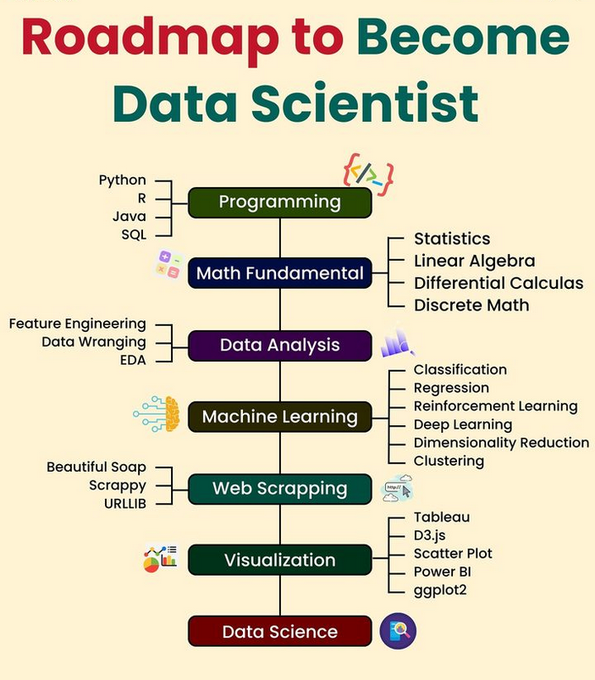
Data science has emerged as one of the most exciting and impactful fields in technology and business. From transforming industries to driving innovation, data scientists play a crucial role in harnessing data to make informed decisions. If you’re aspiring to become a data scientist or looking to enhance your career, this roadmap will guide you through the essential skills, tools, and steps to achieve success in this dynamic field.
1. Understanding the Role of a Data Scientist
Before diving into the technical details, it’s important to understand what a data scientist does. Data scientists are responsible for analyzing complex data sets to derive actionable insights, build predictive models, and inform business strategies. They often work with data engineering, statistical analysis, machine learning, and data visualization to solve real-world problems.
2. Building a Strong Foundation
a. Educational Background:
- Mathematics & Statistics: A solid understanding of probability, statistics, and linear algebra is crucial. Courses or textbooks on these subjects provide the foundation for data analysis and machine learning.
- Programming: Proficiency in programming languages such as Python or R is essential. Python, in particular, is widely used due to its extensive libraries and community support.
b. Key Skills to Develop:
- Data Manipulation: Learn to clean, preprocess, and manipulate data using libraries like Pandas (Python) or dplyr (R).
- Exploratory Data Analysis (EDA): Understand how to explore and visualize data to uncover patterns and insights using tools like Matplotlib, Seaborn (Python), or ggplot2 (R).
3. Mastering Data Science Tools and Technologies
a. Programming Languages:
- Python: Widely used for data science due to its simplicity and rich ecosystem. Key libraries include NumPy, Pandas, Scikit-learn, and TensorFlow.
- R: Known for its statistical analysis capabilities and data visualization libraries like ggplot2 and tidyverse.
b. Data Visualization:
- Tools: Learn to use visualization tools like Tableau, Power BI, or Matplotlib and Seaborn (Python). Effective data visualization helps communicate insights clearly and persuasively.
c. Databases and SQL:
- SQL: Master Structured Query Language (SQL) for querying databases. SQL skills are essential for extracting and manipulating data from relational databases.
d. Big Data Technologies:
- Tools: Familiarize yourself with big data technologies like Hadoop, Spark, and cloud platforms such as AWS, Azure, or Google Cloud. These tools help manage and analyze large data sets efficiently.
4. Developing Advanced Skills
a. Machine Learning:
- Supervised Learning: Understand algorithms like linear regression, logistic regression, decision trees, and support vector machines.
- Unsupervised Learning: Learn clustering techniques like k-means and hierarchical clustering, as well as dimensionality reduction methods like PCA.
- Deep Learning: Explore neural networks and frameworks like TensorFlow and PyTorch for advanced model building.
b. Model Evaluation and Validation:
- Techniques: Learn about model evaluation metrics such as accuracy, precision, recall, F1 score, and ROC-AUC. Understand cross-validation techniques to ensure model robustness.
c. Data Engineering:
- Skills: Gain knowledge in data pipelines, ETL (Extract, Transform, Load) processes, and data warehousing to manage and streamline data workflows.
5. Practical Experience and Projects
a. Hands-On Projects:
- Build a Portfolio: Work on real-world projects or Kaggle competitions to apply your skills and build a strong portfolio. Projects demonstrate your ability to tackle complex problems and showcase your expertise.
b. Internships and Jobs:
- Gain Experience: Seek internships or entry-level positions in data science to gain practical experience and exposure to industry practices. Networking and mentorship can also play a significant role in career development.
6. Staying Current and Evolving
a. Continuous Learning:
- Courses and Certifications: Take online courses or earn certifications from platforms like Coursera, edX, or DataCamp to stay updated with the latest trends and technologies in data science.
- Research and Reading: Keep up with the latest research papers, industry news, and blogs to stay informed about new methodologies, tools, and best practices.
b. Networking:
- Join Communities: Engage with data science communities, attend conferences, and participate in webinars to connect with professionals and learn from industry leaders.
7. Building Soft Skills
a. Communication:
- Skills: Develop strong communication skills to effectively present your findings and insights to non-technical stakeholders. Being able to translate complex data into actionable recommendations is crucial.
b. Problem-Solving:
- Mindset: Cultivate a problem-solving mindset and a willingness to tackle complex and ambiguous challenges. Data science often involves exploring unknown territories and finding innovative solutions.
c. Team Collaboration:
- Collaboration: Work effectively in cross-functional teams, collaborating with engineers, analysts, and business leaders to achieve common goals.
Embarking on a career in data science is both exciting and challenging. By following this roadmap, you can build a solid foundation, master essential tools and techniques, gain practical experience, and stay current with industry developments. Remember, the field of data science is dynamic, and continuous learning and adaptability are key to long-term success.
With dedication and the right approach, you can position yourself as a skilled data scientist and make a meaningful impact in the world of data.